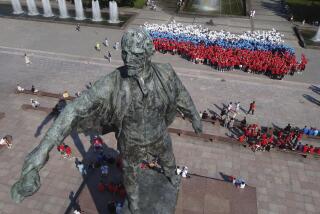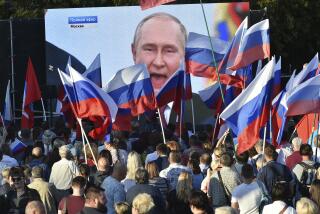What Comes Next : An ‘Evil Empire’ Gone Forever : Experts are debating the country’s future. They say the old Soviet bear is dead, but necessity will spawn new alliances.
WASHINGTON — As they savor the prospect of a national independence that few of them have ever known through 1,000 years of history, the people of most of the Soviet Union’s 15 constituent republics currently seem determined to go their own way.
But paradoxically, many Western experts contend that in the end, the union will prove too weak to fall apart completely.
Unprepared to compete in the world economy, and facing potentially devastating ethnic conflict, the republics will have to form some kind of new bonds just to save themselves from the impact of independence, these experts say.
Leaders of 10 Soviet republics closed ranks with President Mikhail S. Gorbachev on Monday to propose a new union treaty that would essentially allow each republic to define its own form of participation in the central government.
That’s not to say that the old Soviet Union may yet, somehow, reform. In recent years, the Moscow government had become increasingly unpopular, and few are sorry to see it crumble.
A dozen Soviet experts who sometimes agreed on little else concurred in an informal Times survey that the nation that existed even a few days ago is gone forever.
A year from now, the union may have splintered into 15 separate states, aggregated into a few regional federations, or else it may have devolved into a new central power dominated by the Russian Federation and surrounded by tiny satellites.
Francois Heisbourg, director of the International Institute for Strategic Studies in London, predicts that at best there will be only “a very vestigial, residual union structure” by this time next year.
“That doesn’t mean that you won’t have a set of institutions that would be common to several republics,” Heisbourg says, “but these, in practice, will be in the hands of Russia.”
On the other hand, says James R. Schlesinger, former U.S. defense secretary, referring to what has become a daily diet of independence declarations by the Soviet republics, “there is a great deal of optimism--possibly even euphoria--around now. But the economic and political future is kind of grim.”
Adds former Secretary of State Dean Rusk: “It is just possible these republics that are breaking away will pause and realize that they are destroying the Soviet Union as a political entity, and have some second thoughts and try to patch things up.”
What will next year bring to the world’s largest country? The dozen experts produced almost that many scenarios. But there were some common themes:
* The Soviet Union will not survive in its present form.
* The Baltic republics of Estonia, Lithuania and Latvia will obtain total independence and most likely will become members of the United Nations. They probably will form some kind of economic union, though they will jealously guard their political independence.
* The tiny republic of Moldova will go its own way, probably merging into Romania. The republic was part of Romania until it was annexed by Soviet dictator Josef Stalin.
* The Slavic heartland of the Soviet Union--Russia, the Ukraine and Byelorussia--will probably form a new federation, by far the largest and most powerful of the resulting states. Almost certainly dominated by Russia, the Slavic state would be heir to most of the Soviet nuclear might. Some other republics, possibly including Armenia, might join this grouping for economic reasons.
* The Central Asian republics of Uzbekistan, Kazakhstan, Turkmenistan, Kirghizia and Tadzhikistan are unlikely to remain in a Russian-dominated federation and may seek to create their own union, held together by geography and Islam.
Economic necessity may force most of the republics--probably with the exception of the Baltics and Moldova--to accept an overarching economic union, possibly modeled after the European Community.
But such an outcome would require the republics to put aside ancient ethnic animosities suppressed for the last 70 years by the heavy blanket of central Communist government authority. And they may be unable or unwilling to do that.
Madeleine Albright, a Georgetown University professor who participated in a recent Times Mirror polling project in the Soviet Union, says ethnic tensions are evident throughout the country.
“There are deeply ingrained divisions along ethnic lines and there are increasing divisions along social lines, too,” Albright says. “What you had was an empire that papered over these divisions. The question now is, to what extent will these pressures erupt?”
To survive under current conditions, Albright said, the Soviet republics must develop a respect for minority rights that has been almost unprecedented in the history of Russia or the other republics.
“The breakup of the Soviet Union easily could make the bloodshed of Yugoslavia look small,” says Jerry F. Hough, a Duke University professor of Soviet politics.
Almost a third of all Soviet citizens live outside their native republics. Many of these are Russians, who make up the second-largest ethnic group in 10 of the 14 other republics. Russian Federation President Boris N. Yeltsin has already hinted that if the union fractures, Russia might claim sections of other republics where Russians predominate. It was a similar grab for Serbian-populated sections of Croatia that touched off Yugoslavia’s bloody ethnic fighting earlier this year.
None of the experts believe that the Soviet republics will attempt to force people to move to the republics of their ethnic origin. Such a relocation would probably produce more human suffering than the bloody population transfers that marked the birth of India and Pakistan out of the ruins of the British empire.
But experts fear that without some sort of population redistribution, the republics may find it difficult to split totally apart.
The economic woes produced by seven decades of Communist rule may be an even more daunting obstacle to independence.
“They are thrown together economically because the quality of what is produced is unmarketable in the West, with the exception of natural resources,” says Richard Perle, a former Pentagon aide who is now a fellow of the American Enterprise Institute. “I would anticipate a massive attempt to exploit natural resources.”
Despite several years of somewhat hesitant economic reform, the Soviet Union remains essentially a planned economy that has made each republic economically dependent on the others.
Hough expects that this sort of economic interdependence will ultimately preserve the Soviet Union in something like its present form. Although none of the other experts expected the union to survive intact, many of them said that a loose economic confederation may be necessary.
“The thing that we haven’t absorbed in the United States is just how incredibly centralized the Soviet Union remains, even today,” Hough says. “The Lithuanians and the Estonians are still getting all their petroleum and steel by allocation from other republics. If the Baltics left tomorrow and that (supply) was cut off tomorrow, there would be an awful economic crisis. Even if the Soviet Union is going to break up, it will take a long time.”
Judy Shelton, a senior research fellow of the Hoover Institution at Stanford University and a member of a team advising Yeltsin, predicts a loose confederation among most of the republics, “dictated by the need to have overarching economic and foreign relations.”
But Shelton believes this relationship will be driven by the Russian republic.
“I think the Russian Federation will essentially inherit the central banking functions from the old Soviet structure,” she says. “When it comes to defense, you may see an axis between the Russian Federation, the Ukraine and Kazakhstan, because that’s where the (nuclear) missiles and troops are.”
All of the experts agreed that Russia will continue as a major nuclear power no matter what happens to the rest of the republics. And, as such, Russia seems certain to pull a number of other republics into its orbit.
Might that not substitute Russian imperialism for Soviet imperialism?
“It would be dominated by the Russian Federation, but they (Russian leaders) are getting sensitivity training. . . . They are learning that they can antagonize other republics if they don’t tread softly and treat them as equals,” says Gabriel Schoenfeld, a senior fellow at the Center for Strategic and International Studies in Washington.
“Russian imperialism does not bother me, perhaps because it pales in comparison to Soviet Communist imperialism,” Perle says. “Russia will be a very weak country in every respect except militarily. And military power can’t be used very effectively in an imperial sense anymore.”
Seemingly left out in most of the calculations were the Central Asian republics of Uzbekistan, Kazakhstan, Turkmenistan, Kirghizia and Tadzhikistan, perhaps because they have so little in common with the European republics.
However, John Dunlop, a senior fellow of the Hoover Institution, says the Central Asian republics might form a regional grouping that would be strongly influenced by Turkey, a state where the religion is Muslim but the politics are secular.
“Turkey should be working with them,” Dunlop says. “In Islam, there are some worrying currents. A Muslim state will have to take the leadership role, and I see Turkey as the most important state in this regard.”
Heisbourg of the IISS in London said the key indicator of the disintegration of the Soviet Union may be the number of republics that become full members of the United Nations. He predicts that a year from now there will be at least six--Latvia, Estonia, Lithuania, the Ukraine, Byelorussia and “one entity, we don’t know what it will be called, but with its capital in Moscow,” that will also hold a permanent seat on the Security Council.
Rearranging the Pieces of a Toppled Giant
Ask a dozen experts and you’ll get a dozen different visions of what today’s Soviet Union might look like a year from now. The version depicted here simply groups those republics that appear to have the most in common and singles out the “wild cards,” the republics that don’t appear to have any natural alliances. The names of the new groupings are arbitrary.
Times staff writers Paul Houston and James Risen contributed to this report.
More to Read
Sign up for Essential California
The most important California stories and recommendations in your inbox every morning.
You may occasionally receive promotional content from the Los Angeles Times.










